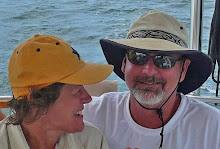
I’ve been thinking about aging, impermanence and life’s relevance lately. Heady topics, I know but cruising the islands and living on a boat is a great environment to conduct such ponderings. My life now is mostly lived out on the boat, anchored or sailing in the sea, with brief excursions to the shore. This harsh environment exults in its impermanence. It’s a place composed of saltwater and sun. A place where everything rusts, even stainless steel. Nuts, bolts, rigging wire, stainless steel knives, and forks, all rust out here. Hell even our cans of WD40 and Rustolium are rusting. The sun, sand and barnacles work relentlessly on the stuff that doesn’t rust. This environment of accelerated aging provides the perfect framework for thoughts about impermanence because it’s all impermanent out here.
Throughout our travels my thoughts have continued to return to the damage we’ve done to the environment. When I say “we” I’m referring to the human race, as humans are unquestionably the biggest polluters and have the largest impact on the planet’s climate. Back in 1973 I took an ecology class that basically scared the hell out of me. We read Rachel Carlson’s Silent Spring, which portrayed the systematic poisoning of the environment. The professor showed us world population growth curves that depicted our growth rate as asymptotic and out of control.
We’ve been reading a lot on Gypsy. We just finished the autobiography of Ed Ricketts (Beyond the Outer Shore), a wonderful book. I wanted to learn more about Steinbeck’s intriguing character “Doc” from Cannery Row. Ed Ricketts was a self-made marine biologist, a life long friend and cohort of John Steinbeck and formative friend of Joseph Campbell. He was also one of the pioneering ecologists who discovered the complex interdependencies of the marine ecosystem and predicted the collapse of the Californian sardine industry. Ricketts had warned the industry but unfortunately his warnings went unheeded.

I can’t seem to escape ominous ecological broodings. Our next book was the biography of Patrick O’Brian who was the author of the incredible 21 volume historical novel set in Britain’s 18th-19th century Navy. At one point O’Brian wrote:
“We are an evolutionary mistake. We evolved too quickly, and now with the instinctive equipment of apes we are faced with a social life as complicated as a beehive. Men cannot live that kind of life; it cannot be done, and I am sure that attempt will kill us as a species.”
It is a pretty grim assessment of our situation but does provide two valuable insights. First that we, especially our social structure, are in a potentially dangerous state of hyper-evolution that is without precedent, which may prove unsustainable and even fatally destructive. Second, is that our species probably doesn’t have the evolutionary tools needed to face the challenges created by our own rapid development. Those are important insights because self-awareness is the best way to deal with shortcomings.
Understanding and valuing “what” is threatened (our culture, the continuation of our species and possibly even all life on our planet) is an important step on our journey of survival. My hope is that through awareness and intense social development that our species may overcome the shortcomings produced by our extraordinary and almost unchecked growth.

The long-term survival of our planet and species is the ultimate mystery story. Thinking in a geological timeframe, it’s really a question of how long we’ll survive rather than if we survive. In the meantime we should make as much progress towards sustainability as possible, be kind to one-another, fully value and make the most of each precious day that we do have. This probably sounds too simplistic. I can’t argue against that but I due propose that it’s often the simple, straightforward actions that serve us best.




